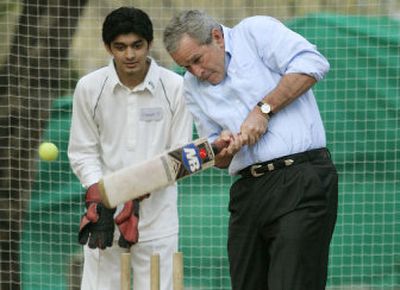Bush tells Pakistan nuclear pact unlikely

ISLAMABAD, Pakistan – President Bush wrapped up his South Asia tour Saturday and headed home with a major diplomatic accomplishment and some reminders that consistency is sometimes the hobgoblin of foreign policy.
At his final stop, the president told Pakistani President Pervez Musharraf that his country shouldn’t expect a civilian nuclear power deal like the one Bush reached with arch-rival India, and he praised Pakistan’s halting steps toward democracy only hours after police rounded up opposition leaders and anti-Bush protesters.
“Pakistan and India are different countries with different needs and different histories,” Bush told reporters after discussing the nuclear issue with Musharraf behind closed doors.
The president has made promoting democracy and fighting terrorism the dual centerpieces of his foreign policy. But his ability to pressure Musharraf on those fronts is limited because Pakistan is central to efforts to contain the spread of nuclear weapons and Islamic extremism, hopes for stabilizing Afghanistan and the war on terrorism.
Musharraf assured Bush that Pakistan remains a stalwart ally in the war on terror, despite what he called some “slippages” on the battlefront.
The two leaders didn’t mention Osama bin Laden during their joint public appearance Saturday. The al-Qaida leader is believed to be hiding along the rugged border between Afghanistan and Pakistan, and his ability to evade capture has been one of the biggest disappointments in the anti-terror effort.
U.S. officials also want Pakistan to do more to root out holdovers from Afghanistan’s former Taliban regime who use Pakistan as a base for cross-border attacks against the new U.S.-backed Afghan government.
Similarly, Bush appeared careful to balance his enthusiasm for democracy with a recognition that if Pakistan is the indispensable nation, Musharraf, an army general who seized power in a 1999 military coup, is its indispensable man.
If Bush pressed Musharraf toward greater openness, he did so in private. In public, he said: “We spent a lot of time talking about democracy in Pakistan. We share a strong commitment to democracy.”
Police in Islamabad disrupted a planned protest march by rounding up more than 100 demonstration organizers in predawn raids on Saturday. In the nearby city of Rawalpindi, police prevented even small groups of protesters from gathering, rounding them up quickly.
If the agreement with India, the trip’s showcase achievement, was a nod to reality in India, it’s put the administration on a collision course with other realities in Pakistan, in Congress and among other nations that are trying to prevent nuclear proliferation.
The deal, announced on Thursday, would clear the way for international cooperation on India’s civilian nuclear program but leave its weapons program intact.
In Pakistan, Musharraf told Bush that Pakistan wants to join rival India as a respected member of the nuclear club. That’s unlikely because while both countries developed nuclear weapons in defiance of international agreements, only Pakistan has a record of sharing its nuclear technology with other countries.
The deal also may encounter opposition in Congress and in the Nuclear Suppliers Group, a voluntary association of 45 nations that have agreed to restrict civilian nuclear technology to countries that develop nuclear weapons outside of arms control agreements.